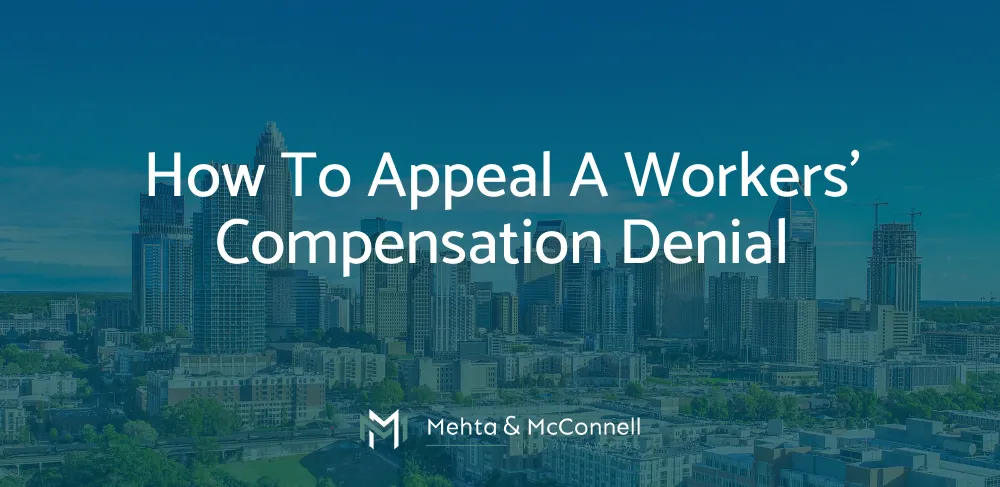 Workers' Compensation
Workers' Compensation
According to the North Carolina Department of Insurance, with few exceptions, all businesses employing three or more employees in North Carolina must carry workers’ compensation insurance.
This mandatory coverage rule assures all North Carolina workers have the right to certain workers’ compensation benefits when they are injured on the job or develop an illness because of working conditions.
Filing for workers’ compensation is straightforward. But when an employer denies or disputes your claim, knowing how to respond can be confusing.
An experienced workers’ compensation attorney at Mehta & McConnell, PLLC, can help you navigate this complex process.
One of our skilled legal advocates can explain how to appeal a denied claim and handle the legal process so that you can focus on recovering from your injury.
How Long Does My Employer Have to Deny My Workers’ Compensation Claim?
After sustaining an on-the-job injury in North Carolina, injured workers have thirty days to provide written notice to their employers, and two years to file a Notice of Accident to Employer form with the North Carolina Industrial Commission.
Upon the filing of a Notice of Accident to Employer with the North Carolina Industrial Commission the employer has thirty days in most cases to either accept, deny, or request additional time to investigate the claim.
Your employer may accept your claim, or notify you that they’ve denied your claim via a Denial of Workers’ Compensation Claim form.
Alternatively, your employer may send you a Notice of Payment of Compensation or Medical Benefits Only Without Prejudice form, which provides you with workers’ compensation benefits while giving your employer up to 90 more days to complete their investigation and accept or deny your claim.
Why Was My Workers’ Compensation Claim Denied?
U.S. Department of Labor statistics show that workers’ comp denied to an employee happens in nearly 50% of all claims.
Common grounds for workers’ comp denial include, but are not limited to, disputes over the following:
- Whether your injury is employment related,
- Whether your injury occurred on the clock,
- The circumstances surrounding your injury,
- The evidence supporting your injury,
- Whether there is a valid connection between the workplace accident and your injury,
- Whether your injury existed before the accident,
- Whether you received medical treatment or followed your doctor’s instructions,
- Whether you submitted a complete or correct workers’ comp claim form or followed injury reporting requirements,
- Whether your employer or insurer submitted a complete or correct claim form or followed injury reporting requirements,
- A lack of adequate information,
- Whether you were under the influence of drugs or alcohol when the accident occurred, and
- Whether you were an employee or an independent contractor.
Regardless of the reason your employer is refuting your workers’ compensation claim, if you believe your claim was wrongly denied, you should take quick action to appeal the decision.
A qualified workers’ compensation attorney can review your case and the reasons why your claim was denied and help you take the right steps to appeal the decision.
What Should I Do Before Filing a Workers’ Compensation Claim?
You should take several steps before filing an appeal after your employer or their insurer denies your workers’ comp claim, including the following:
- Contact an attorney;
- Contact your employer and the insurer to assure both you and they filed the appropriate forms and submitted the relevant information and that there weren’t any paperwork errors;
- Supply the insurer with any extra information that may help your claim, for example, new medical documents or the names of people who witnessed your accident;
- Contact the North Carolina Industrial Commission (NCIC) to ensure they have all your relevant forms and documents;
- Keep track of items that could help your case, such as co-worker testimony, medical bills and receipts, and wage and tax statements;
- Follow your doctor’s instructions about work and work activity restrictions and notify them of any new symptoms or side effects;
- Keep all follow-up appointments and follow through on recommended treatments;
- Make sure the NCIC and your employer have your current contact information; and
- File your claim within two years of the date of your accident.
Getting a workers’ compensation denial overturned requires being familiar with the appeals process and knowing how to collect and present the best evidence to support your claim.
You can file your own workers’ compensation claim.
But, you’ll have a much better chance of success if you work with a qualified worker’s compensation attorney with proven experience handling workers’ compensation cases.
How to Appeal Workers’ Comp Denial
You have up to two years from your date of injury to file a workers’ comp denial appeal.
However, you should file your claim as soon after a denial as possible so that you have adequate time to complete the extensive preparation required to win your case.
If your workers’ compensation claim is denied and you wish to appeal the decision, take the following actions:
- Notify the NCIC of your intent to appeal by filing your claim with the Commission;
- Request a hearing by submitting a Request that Claim be Assigned for Hearing form to the NCIC;
- Participate in mediation with your employer’s insurance representative as required by the NCIC—you may have an attorney represent you at the conference;
- Wait for the mediator to forward their recommendation to the NCIC;
- If you can’t reach an agreement or disagree with the mediator’s recommendation, you and your attorney will prepare for the hearing;
- Attend the hearing with your attorney, present evidence, and participate in questioning and cross-examination before an NCIC Deputy Commissioner; and
- Wait for the Commissioner to render a decision.
You will have 15 days to request an appeal with the three-judge Full Commission if you disagree with the Commissioner’s decision.
If you disagree with the Full Commission’s decision, you may be able to file an appeal through the North Carolina Court of Appeals.
If you disagree with the North Carolina Court of Appeals’ decision, you may be able to appeal to the North Carolina Supreme Court.
Whatever you decide, appealing a denied work injury claim is a complicated legal matter, which is why it’s best to work with an experienced employment law attorney.
At Mehta & McConnell, our attorneys can investigate your claim, handle all your workers’ comp and insurer communications, and help you address all the issues involved in seeking a fair settlement.
Contact Mehta & McConnell Today
At Mehta & McConnell, we have 30 years of combined experience helping our clients seek the compensation they deserve for their injuries.
If your workers’ comp claim was denied, we can help you file a claim with the NCIC and represent you throughout the mediation and hearing processes.
From devising a cost-effective strategy to helping you fight for every penny your injury is worth, you will receive compassionate and professional representation when you work with us.
At Mehta & McConnell, we pride ourselves on providing clients with personal attention and will work tirelessly to achieve the best outcome possible for your case.
Contact us today to schedule a free consultation to learn more about how we can help you appeal your workers’ compensation denial.
